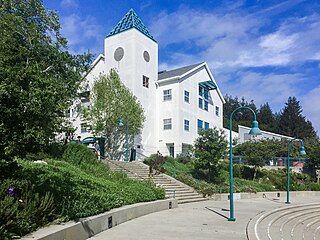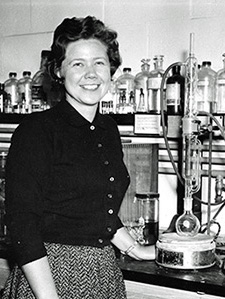Related Research Articles

The University of California, Santa Cruz is a public land-grant research university in Santa Cruz, California. It is one of the ten campuses in the University of California system. Located on Monterey Bay, on the edge of the coastal community of Santa Cruz, the main campus lies on 2,001 acres (810 ha) of rolling, forested hills overlooking the Pacific Ocean. As of Fall 2022, its ten residential colleges enroll some 17,500 undergraduate and 2,000 graduate students. Satellite facilities in other Santa Cruz locations include the Coastal Science Campus and the Westside Research Park and the Silicon Valley Center in Santa Clara.

George William "Bill" Domhoff is a Distinguished Professor Emeritus and research professor of psychology and sociology at the University of California, Santa Cruz, and a founding faculty member of UCSC's Cowell College. He is best known as the author of several best-selling sociology books, including Who Rules America? and its seven subsequent editions.

Rachel Carson College is a residential college at the University of California, Santa Cruz. Named in honor of conservationist Rachel Carson, it is on the west side of campus, north of Oakes College and southeast of Porter College. The current provost of the college is Professor Sue Carter, also a faculty member of UCSC's Physics Department. The theme of its freshman core course is Environment and Society.

Huascarán National Park is a Peruvian national park that comprises most of the mountain range known as Cordillera Blanca which is part of the central Andes, in the region of Ancash. The park covers an area of 340,000 hectares and is managed by the Peruvian Network of Protected Natural Areas, or SERNANP. It was designated as a World Heritage Site in 1985 by UNESCO, is also a well-known mountaineering spot, and harbors a unique biodiversity with plant species such as the Queen of the Andes, trees of the genera Polylepis and Buddleja, and animals such as spectacled bears, condors, vicunas, and tarucas.
History of Consciousness is the name of a department in the Humanities Division of the University of California, Santa Cruz with a 50+ year history of interdisciplinary research and student training in "established and emergent disciplines and fields" in the humanities, arts, sciences, and social sciences based on a diverse array of theoretical approaches. The program has a history of well-known affiliated faculty and of well-known program graduates.
Fred Keeley is a politician in California, U.S. and serves as the current Mayor of Santa Cruz, CA. Due to recent amendments to the cities' charter he is the first directly elected mayor with a four year term, as the mayoral role was traditionally a one year term selected by other council members. Keeley was a member of the California State Assembly, representing District 27 which included parts of Santa Cruz County and Monterey County from 1996 to 2002. He retired in January 2015 after 10 years as the Treasurer of Santa Cruz County.
Sarah Anne Radcliffe is a geographer and academic, who is Professor in Latin American Geography at the University of Cambridge and a fellow of Christ's College, Cambridge. She is an editor at the Progress in Human Geography journal. In 2020 she was elected a Fellow of the British Academy.
The UCSC Silicon Valley Initiatives are a series of educational and research activities which together increase the presence of the University of California in Silicon Valley. To that end, UC Santa Cruz has set up a 90,000 square-foot satellite campus called the University of Santa Cruz Silicon Valley Campus (SVC), currently located on Bowers street in Santa Clara, California, where it has been since April 2016 The Initiatives, still in the early stages of their development, have had ambitious hopes attached to them by UCSC, among them the possibility of a home for the University's long-planned graduate school of management and the Bio|Info|Nano R&D Institute. It currently houses professional the SVLink incubator-accelerator program, programs and a distance education site for the UCSC Baskin School of Engineering, the UCSC Silicon Valley Extension, the Office of Industry Alliances and Technology Commercialization leadership, and the University of California's online learning program, UC Scout.
Anthony Bebbington is a geographer, International Director for Natural Resources and Climate Change at the Ford Foundation and Higgins Professor of Environment and Society in the Graduate School of Geography, Clark University, USA. He was previously ARC Laureate Professor at the School of Geography, University of Melbourne, Australia (2016-2019).

James Clifford is an interdisciplinary scholar whose work combines perspectives from history, literature, history of science, and anthropology.

The mineral industry of Peru has played an important role in the nation's history and been integral to the country's economic growth for several decades. The industry has also contributed to environmental degradation and environmental injustice; and is a source of environmental conflicts that shape public debate on good governance and development.
Eric Holt Giménez is an agroecologist, political economist, lecturer and author. From 1975 to 2002 he worked in Mexico, Central America and South Africa in sustainable agricultural development. During this time he helped to start the Campesino a Campesino Movement. He returned to the U.S. twice during this period: once for his M.Sc. in international agricultural development and then for his Ph.D. in environmental studies. His dissertation research was the basis for his first book Campesino a Campesino: Voices from the farmer-to-farmer movement for sustainable agriculture in Latin America. After receiving his Ph.D. with an emphasis in agroecology and political economy, he taught as a university lecturer at UC Santa Cruz and Boston University in the International Honors Program in Global Ecology. He gives yearly courses of food systems transformation and social movements in Italy in the Masters program of the University of Gastronomic Sciences in Pollenzo and in the doctoral program at the Universidad de Antioquia in Medellín, Colombia. His work has appeared in The New York Times, The Herald Tribune, Le Monde Diplomatique, La Jornada and The Des Moines Register. He has a blog on the Huffington Post.
Louis B. "Bert" Muhly was an American politician, academic, planning practitioner and social activist.
M. Sanjayan is an American conservation scientist, writer and television news contributor, specializing in the role of nature in preserving and enhancing human life. He is referred to as Sanjayan, using one name as is sometimes Tamil custom. He is chief executive officer at Conservation International, a global conservation organization working to protect the nature people around the world rely on for food, freshwater, and livelihoods.
Juan Poblete is Professor of Latin American Literature and Cultural Studies at the University of California, Santa Cruz. Poblete began his career as a UCSC Assistant Professor in 1997. He is also the provost of Kresge College at UCSC and a Governing Board Member of the Latino Literary Cultures Project/Proyecto Culturas Literarias Latinas.

Lise Getoor is a professor in the computer science department, at the University of California, Santa Cruz, and an adjunct professor in the Computer Science Department at the University of Maryland, College Park. Her primary research interests are in machine learning and reasoning with uncertainty, applied to graphs and structured data. She also works in data integration, social network analysis and visual analytics. She has edited a book on Statistical relational learning that is a main reference in this domain. She has published many highly cited papers in academic journals and conference proceedings. She has also served as action editor for the Machine Learning Journal, JAIR associate editor, and TKDD associate editor.
Patricia Zavella is an anthropologist and professor at the University of California, Santa Cruz in the Latin American and Latino Studies department. She has spent a career advancing Latina and Chicana feminism through her scholarship, teaching, and activism. She was president of the Association of Latina and Latino Anthropologists and has served on the executive board of the American Anthropological Association. In 2016, Zavella received the American Anthropological Association's award from the Committee on Gender Equity in Anthropology to recognize her career studying gender discrimination. The awards committee said Zavella's career accomplishments advancing the status of women, and especially Latina and Chicana women have been exceptional. She has made critical contributions to understanding how gender, race, nation, and class intersect in specific contexts through her scholarship, teaching, advocacy, and mentorship. Zavella's research focuses on migration, gender and health in Latina/o communities, Latino families in transition, feminist studies, and ethnographic research methods. She has worked on many collaborative projects, including an ongoing partnership with Xóchitl Castañeda where she wrote four articles some were in English and others in Spanish. The Society for the Anthropology of North America awarded Zavella the Distinguished Career Achievement in the Critical Study of North America Award in the year 2010. She has published many books including, most recently, I'm Neither Here Nor There, Mexicans' Quotidian Struggles with Migration and Poverty, which focuses on working class Mexican Americans struggle for agency and identity in Santa Cruz County.

Jean H. Langenheim was an American plant ecologist and ethnobotanist, highly respected as an eminent scholar and a pioneer for women in the field. She has done field research in arctic, tropical, and alpine environments across five continents, with interdisciplinary research that spans across the fields of chemistry, geology, and botany. Her early research helped determine the plant origins of amber and led to her career-long work investigating the chemical ecology of resin-producing trees, including the role of plant resins for plant defense and the evolution of several resin-producing trees in the tropics. She wrote what is regarded as the authoritative reference on the topic: Plant Resins: Chemistry, Evolution, Ecology, and Ethnobotany, published in 2003.

The environmental history of Latin America has become the focus of a number of scholars, starting in the later years of the twentieth century. But historians earlier than that recognized that the environment played a major role in the region's history. Environmental history more generally has developed as a specialized, yet broad and diverse field. According to one assessment of the field, scholars have mainly been concerned with "three categories of research: colonialism, capitalism, and conservation" and the analysis focuses on narratives of environmental decline. There are several currents within the field. One examines humans within particular ecosystems; another concerns humans’ cultural relationship with nature; and environmental politics and policy. General topics that scholars examine are forestry and deforestation; rural landscapes, especially agro-export industries and ranching; conservation of the environment through protected zones, such as parks and preserves; water issues including irrigation, drought, flooding and its control through dams, urban water supply, use, and waste water. The field often classifies research by geographically, temporally, and thematically. Much of the environmental history of Latin America focuses on the nineteenth and twentieth centuries, but there is a growing body of research on the first three centuries (1500-1800) of European impact. As the field established itself as a more defined academic pursuit, the journal Environmental History was founded in 1996, as a joint venture of the Forest History Society and the American Society for Environmental History (ASEH). The Latin American and Caribbean Society for Environmental History (SOLCHA) formed in 2004. Standard reference works for Latin American now include a section on environmental history.

Simon Batterbury is a British-Australian geographer, Professor of Environmental Studies at the University of Melbourne, Australia and a visiting professor at Lancaster University, UK.
References
- ↑ Jeffrey T. Bury at University of California in Santa Cruz
- ↑ "Jeffrey Bury." Courses, UC Santa Cruz, envs.ucsc.edu/faculty/index.php?uid=jbury.